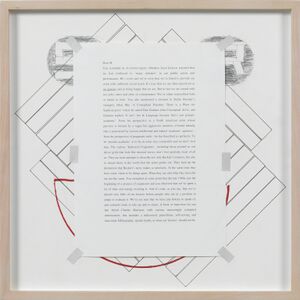Letters to the Red Crayola III, 1990-2012
| Letters to the Red Crayola III, 1990-2012 | |
|---|---|
 | |
| Art & Language | |
| Project | Letters to the Red Crayola |
| Year | 2012 |
| Dimensions | 41.4 × 41.4 cm[1] |
| Materials | Ink, acrylic, collage and mixed media on paper |
Text
Dear M,
You reminded us of certain regrets. Matthew Jesse Jackson reported that we had confessed to 'many mistakes' in our public action and performance. He's even said we're sorry that we've failed to provide our work with sufficient social reach. It's true that we are often perceived as sui generis and as being happy that we are. But in fact we are cursed with two jobs: artist and critic or commentator. We've either redescribed both or failed in both. You also mentioned a moment in Stefan Roemer's strangely titled film 'A Conceptual Paradise: There is a Place for Sophistication' where he asked Dan Graham what Conceptual Art is, and Graham replied 'It isn't Art & Language because that's just pseudo-academic'. From his perspective as a North American artist whose purview is formed by a vague but aggressive intuition of brand identity that is patronised by various intellectual and indeed 'academic' agencies—from the perspective of pragmatic truth—he has described us perfectly. To be 'pseudo-academic' is to be in some way counterfeit and we don't fool him. The various 'Indexical Fragments', including those printed in red above grids that look like musical staves, don't fool anybody, least of all us. They are mad attempts to describe not only Beckett's trousers, but also to situate them in the world that the tailor points out. They fuck up the distinction that Beckett's story makes so precisely. At the same time they have some claim to be things apart. What they are and what they describe are not the same. You remarked at some point that the late 1960s saw the beginning of a process of expansion and you observed that we've spent a lot of time and energy resisting it. And it's true, as you say, that we've placed very little of our history before people who are in a position to judge or evaluate it. We're not sure that we have any history to speak of, and certainly none to tidy up and to claim. A book of interviews by our late friend Charles Harrison, with various increasingly corrupted interlocutors, that includes a ludicrously punctilious, self-serving and inaccurate bibliography, speaks loudly or what our 'history' should not be.
Interpretations
- The film mentioned is Stefan Römer's "A Conceptual Paradise: There is a Place for Sophistication" (2006). Art & Language and Charles Harrison were interviewed for the film. Link. The remark from Dan Graham can be seen here: Link
- The text references Indexical Fragments
- It may also be referring to a story of Samuel Beckett
- The book mentioned is Charles Harrison: Looking Back (2011)